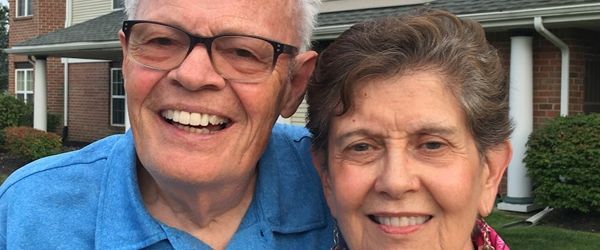
Remembrance: The missionaries who stayed home
By Anna McShane — Missionaries are known as those who go, but God calls some to stay. Such were Richard and Bobbi Oestreicher—the missionaries who stayed home.
When COVID-19 took both Richard, known as RO, and Bobbi within days of one another, the response from SEND missionaries was overwhelming. Why? Because this faithful couple touched the lives of SEND missionaries deeply for 60 years.
RO graduated from University of Michigan with an MBA and went to Moody Bible Institute, seeking God’s will for a life of service. There, in 1959, he met Philip Armstrong and arranged an interview with SEND.
“It only took about five minutes for us to know where I belonged,” RO said.

Richard Oestreicher with Philip Armstrong, the first director of SEND International.
In RO, the mission acquired a business manager who would advocate for missionaries for generations. Back when RO and Bobbi joined SEND, which turns 75 this year, it was known as the innovative and energetic Far Eastern Gospel Crusade.
Within a year, the fledgling mission, less than 15 years old, decided to move its headquarters from Minnesota to Detroit. RO, a native Michigander, took charge of the move. It was RO who brought the first electric typewriter into the office, RO who branched out from business manager/treasurer to begin a development department. It was RO who had the vision to put retirement funds into mission support before most missions even thought of it, RO who recruited volunteers to do office jobs so that the staff could focus on member care, and RO who brought SEND into the computer age in 1984.
RO was at the front of the curve. I know, because he scripted what became the rest of my life. In the early 1970s, my husband and I were fresh out of grad school with communications degrees and looking for God to lead us into missions. RO looked ahead and decided that SEND needed a communications department. Of the many interdenominational missions, only four had in-house communications staff.
RO put his head together with the US director and devised a recruitment plan that went far beyond, “Come work in the US Office.” They put us overseas as embedded journalists on a church planting team for four years before we ever reached the office and launched SEND Media. RO realized that, because we had been in the trenches of overseas ministry, we’d be trusted within SEND to produce prayer, recruitment, and promotional materials.
RO and Bobbi, the missionaries who stayed home, did take quite a few jaunts overseas, several with us. Perhaps the most memorable was a media/development trip to Russia and Ukraine just after the wall came down. For 30 years, we laughed together over the night that six of us, three couples, shared one bedroom, three single beds, in a little farmhouse in Ukraine with an outhouse down the path.
The Oestreichers served SEND’s missionaries because they loved them, loved the Lord, and knew that missionaries need people who are willing to serve quietly, faithfully, on the home front. They raised support like all missionaries but they got no glory, no departure parties, and no welcome home galas—simply a life of hard work so that others could have that honor.
RO and Bobbi are gone, but their legacy lives on in the generations after them. In their sudden passing, many wrote to say:
“Great loss, heaven’s gain.”
“Two giants; we grieve.”
“Fond, fond memories of working together.”
“Examples of godliness; we are blessed to have known them and had them in our lives.”
“What a wonderful team they were for SEND and the Kingdom.”
And most important, “I’m sure they heard, ‘Well done, good and faithful servants.’”
Bobbi Oestreicher died April 14 at the age of 83. Richard Oestreicher died April 17 at the age of 85. Click here to read the family’s obituary.
Additional Posts




